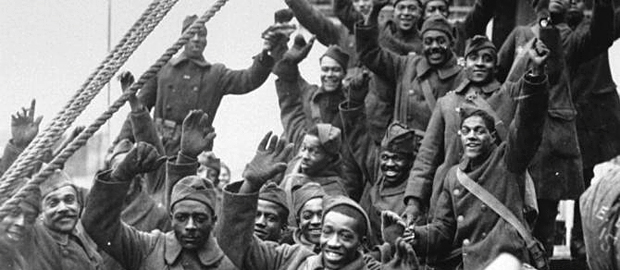World War I and the African-American experience
Racial discrimination in the army helped lay the groundwork for the civil rights movement decades later

Though often overshadowed by World War II, the African-American experience in World War I was a transformative moment in black history, says Chad Williams, chair of the Department of African and African American Studies at Brandeis University. The author of “Torchbearers of Democracy: African-American Soldiers in the World War I Era,” Williams says the African-American experience in the Great War sowed the seeds of the civil rights movement that would flower decades later.
To mark the centennial of the Austrio-Hungarian Empire’s declaration of war on Serbia on July 28, 1914 — the first declaration in a series over the course of a week that marked the beginning of World War I — Williams spoke to Brandeis Now about the war’s place in shaping modern black history.
 |
| Chad Williams |
How were African-American soldiers received during the war and afterward?
The service of African-Americans in the military had dramatic implications for African-Americans. Black soldiers faced systemic racial discrimination in the army and endured virulent hostility upon returning to their homes at the end of the war. At the same time, service in the army empowered soldiers to demand their individual rights as American citizens and laid the groundwork for the future movement for racial justice.
How did the lessons African-American leaders learned during World War I shape the way World War II was handled and the civil rights movement?
The memory of the First World War — the opportunities as well as the disappointments — remained very much alive for African-Americans as the Second World War approached. In many ways, World War I marked the beginning of the modern civil rights movement for African-Americans, as they used their experiences to organize and make specific demands for racial justice and civic inclusion. These efforts continued throughout the 1920s and 1930s. The “Double V” campaign — victory at home and victory abroad — adopted by African-American leaders during World War II was informed by the lessons of World War I and an insistence that the United States must first and foremost ensure freedom for African-Americans.
Did World War I provide an opportunity for African-American soldiers to reconnect with their roots?
For most African-American soldiers, service in World War I allowed them to broaden their social, political, geographic and cultural horizons. Having the opportunity to travel to different parts of the country and, for the approximately 200,000 African-American soldiers who served overseas, to different parts of the world, was a life-altering experience.
Did the war serve as an opportunity to spread African-American culture internationally?
In France, many African-American soldiers interacted with African soldiers and laborers from the French colonies in North and West Africa, forging bonds and sowing the seeds of a pan-African consciousness. African-American soldiers also became cultural ambassadors, introducing France and the world to jazz through the various regimental bands that took the country by storm.
At home, what were the most prominent effects of the war on African-Americans?
World War I marked the beginning of the Great Migration, the most prominent and lasting effect of the war on African-Americans and the nation. Eager to escape the racially oppressive social and political environment of the South and lured by wartime industrial job opportunities, approximately 500,000 African-Americans migrated to northern cities such as Chicago, New York and Detroit. The Great Migration, which continued throughout the 1940s, fundamentally transformed the demographics of the United States.
What role did African-American women play during the war?
African American women played a central role in the war effort. Existing networks of black women’s organizations mobilized on the national and communal levels to provide support for African-American soldiers at training camps throughout the country. Black women also served in various social welfare organizations like the Red Cross, YMCA and YWCA to provide much needed support to black troops in the face of institutionalized discrimination. As they supported African-American soldiers, black women also used the war effort to advance their own claims to equal citizenship.
Read more: When World War I ended, the civil rights movement was just getting started
Categories: General, Humanities and Social Sciences, International Affairs





